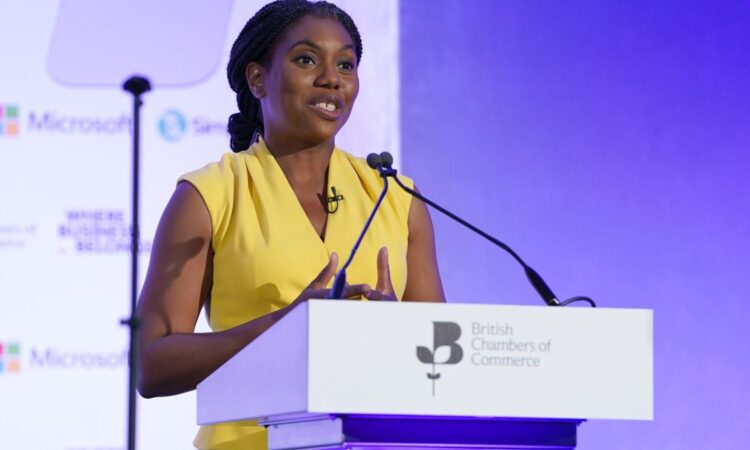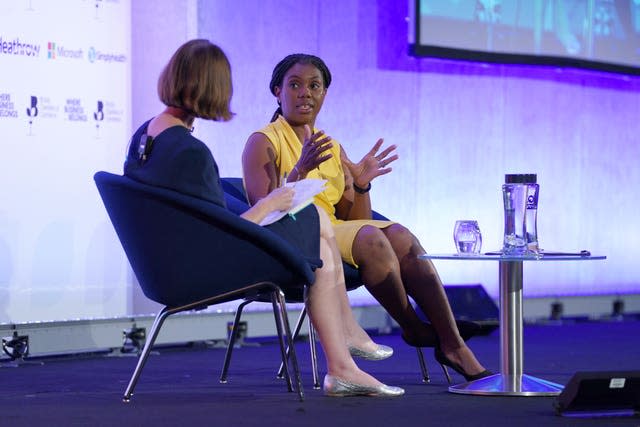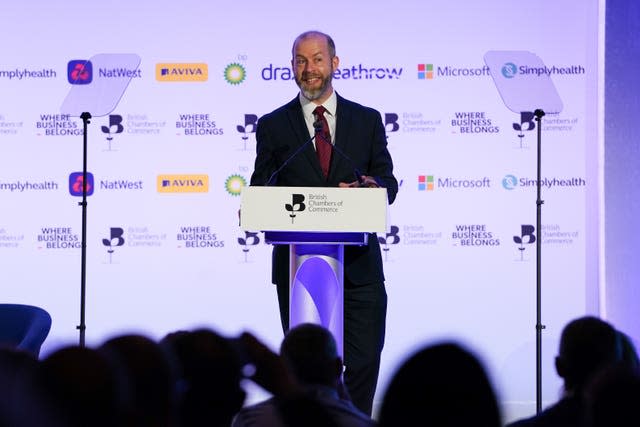
Business Secretary Kemi Badenoch has said she hears “quite frequently” pleas for increased trade with European Union countries, but with lower costs for businesses.
Taking questions at the British Chambers of Commerce annual conference in Westminster on Thursday, Ms Badenoch said her department has a “long list of trade barriers” which her team is working through “one by one, day by day”.
The Conservative Cabinet minister’s Labour “shadow”, Jonathan Reynolds, also spoke at the event, saying the UK’s relationship with the 27-member trading bloc should be driven by “good faith and reason, not by the internal politics of the Conservative Party”.
Asked about her party’s plan to improve the UK’s trading relationship with the EU, Ms Badenoch said: “One of the challenges is that every country does things differently, so what the Netherlands does is different from what Belgium does, is different from France – France is particularly tricky.
“But we are unpicking some of these things on a country-by-country basis as well, which we can do.
“For instance with Italy, we used to charge VAT on each others’ products after we left, that’s something we’ve been able to negotiate away and have removed, so this is us just carrying out our independent trade policy.”
She added: “I have a long list of trade barriers, market access barriers, which we will remove for every country.”
Ms Badenoch also took a question about the UK’s relationship with the United States, where the Westminster Government has signed a series of trade pacts with individual states, including Texas and Florida.
Each pact, known as a memorandum of understanding (MOU), “is solely an expression of the participants’ intention to establish a mutually beneficial relationship and is not an international agreement or treaty”.


The Business Secretary said a future UK-US free trade agreement “depends on who wins the US election”.
She added: “What I meant by that is that when Donald Trump was president of the US, we were working on a trade deal – I’ve seen the papers, one was in the works and it was pretty much nearly done.
“And when Joe Biden became president, they said ‘we’re not doing free trade agreements and we’re not doing them with any country anywhere in the world’, and the reason that was given when I spoke to Republican members of Congress when I was in (Washington) DC was that there was a lot of trade union influence in the Biden administration – that is what I was told.
“And trade unions are more protectionist, they don’t like the competition from free markets and they also feel that free markets and free trade damage home businesses, and they think that it might lower standards and so on, which is not true, certainly not for the deals that we sign in this country.”
Ms Badenoch denied she would prefer to see Mr Trump become president over Mr Biden in the US elections later this year and added: “I don’t know what his policies would be.”


She used her speech to repeat her party’s controversial mantra: “Don’t surrender to Labour.”
She said: “They want you to think everyone will become younger and China will be nicer if you just vote Labour.
“That’s why after 14 years of not knowing what to do, their solution to these problems is to bring in a Race Equality Act and more workplace regulations to control you and, of course, more taxes.”
Mr Reynolds said at the conference: “We will take the grown-up approach to Brexit that the Government has lacked.
“We know we can do better and Labour will not be seeking to rejoin the single market or the customs union, or to reopen the wounds of the past, because that wouldn’t give us the stability which we know is essential.
“We’re clear we need to get a better deal and there are real improvements we could achieve.
“If New Zealand can have a veterinary agreement with our closest neighbours, so can we.”
He also said: “I don’t believe in any sense that our pro-worker side of that, the plan to make work pay, is anything anyone should be worried about.
“We’ve consulted very widely with businesses about it. It does raise the employment floor in the UK, but frankly the vast majority of businesses here will be operating very much above that in time.”
Decisions on flexible working would be more “two-sided than one-sided, that is the changes to, for instance, zero-hours contracts”, he said.
Mr Reynolds also defended Labour’s overall election strategy, adding: “We’re not pitching you a new Netflix series. We’re not putting on politics as entertainment.
“We want to return to serious government, to effective policy and to politics as public service, not as pantomime.”






